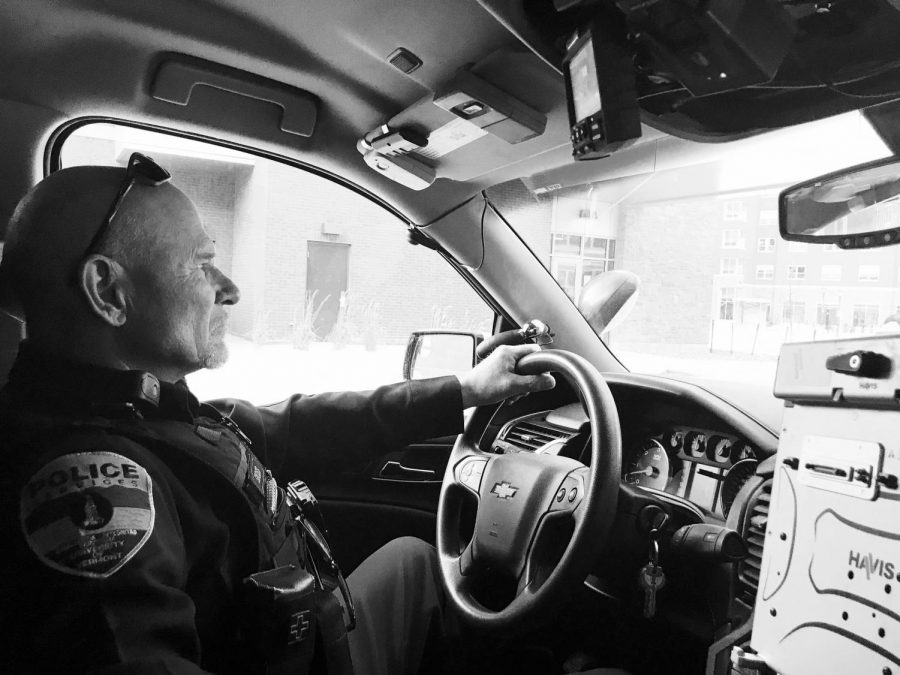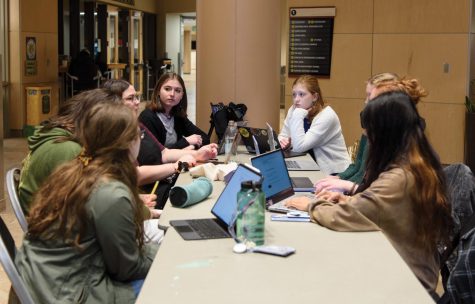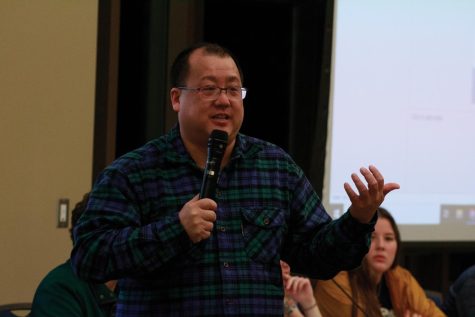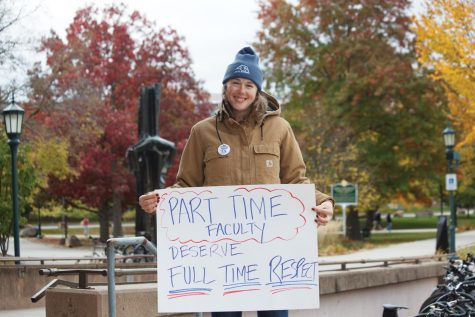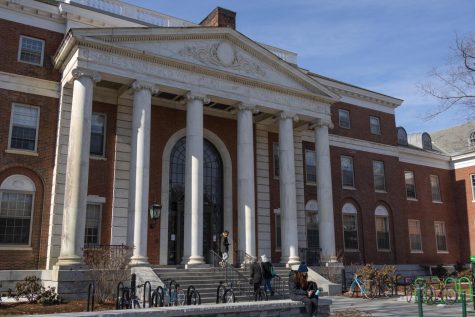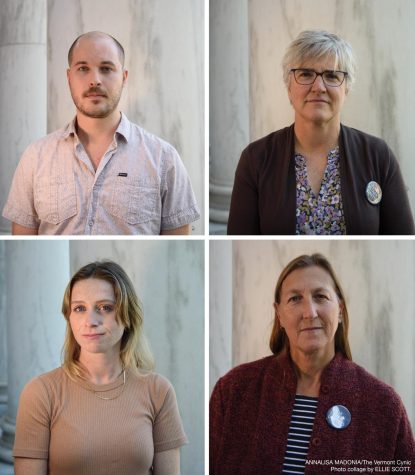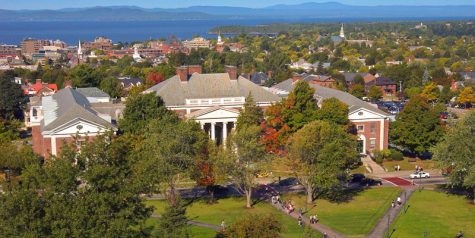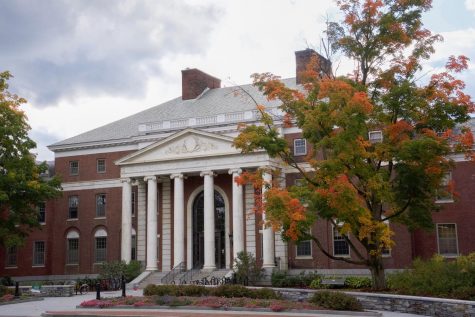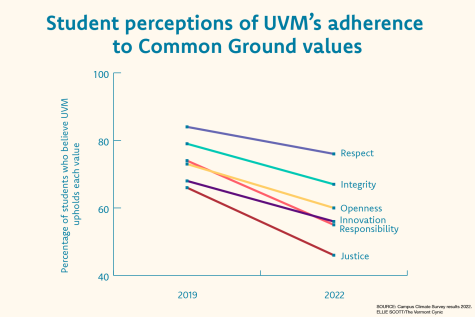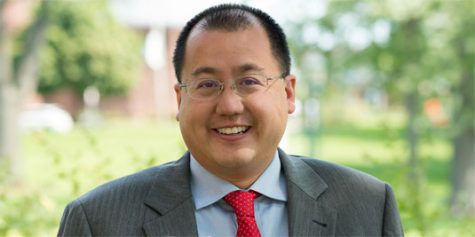Campus cops patrol the college community
Officer Bill Scioss of UVM police services patrols the campus looking for suspicious activity. UVM police officers respond to emergency calls on campus, but also perform daily safety walkthroughs of buildings and support on-campus events.
March 8, 2019
A Saturday shift for UVM police services can range from dealing with rowdy college students, busting a driver for a DUI, or doing crowd control at an athletic event.
Between three different shifts and officers, a day at UVM police services consists of interacting with students, dropping in at various on-campus activities such as farmer markets and women’s basketball games and occasionally dealing with the hostilities that comes with working in law enforcement.
All police services officers attend the Vermont Police Academy in Pittsford, Vermont, said Jason Harris, a UVM police services officer.
A standard shift starts with roll call, where officers are given a briefing about assignments and things to look out for, and a cruiser check, Harris said.
Cruiser checks allow for officers to ensure that their cruisers are properly equipped with things such as radar speed guns and breathalyzers, he said.
Saturday day shifts are typically slower, Officer Bill Sioss said.
Sioss spends his shifts checking in on various campus activities, walking through buildings, and
Sioss has been with UVM police services for thirteen years, after previously working for the military.
For many officers, Saturday nights consists of patrols throughout the campus, neighborhoods and parking lots that accompany UVM facilities, Harris said.
While on patrol, officers look out for potential break-ins to buildings, driving violations and students incapacitated from drinking.
Officers will either bring students who have drank too much to detox at locations such as Act One or the hospital. Officers will also offer courtesy rides for a variety of reasons, one of them being a student who is walking home alone on a cold night, he said.
“Especially with the recent unfortunate circumstances, we try to make sure people are making it home safe,”’ Harris said.
After the recent death of undergrad Connor Gage, Harris encourages students to use UVM police service as a resource.
“I don’t think you’re ever wrong to call the police. That’s why we are here,” Harris said.
Patrol routes for UVM police services extend far past UVM’s campus, with routes going downtown and even to surrounding towns such as Essex, Colchester and South Burlington where there are student hotspots, such as student neighborhoods, bars and frat houses, and other UVM buildings and facilities, he said.
All police services officers attend the Vermont Police Academy in Pittsford, Vermont, said Jason Harris, a UVM police services officer.
Harris has been with UVM police services since August, after two years of working in nearby Lamoille County.
UVM police services also assist the Burlington, South Burlington and Winooski police departments with things like calls for backup and assisting with closing the bars downtown., Harris said.
Officer Melanie Waldbrise ‘13 has experienced both being a student and working to ensure the safety of the student body by graduating from a UVM and working for UVM police services for the past five years.
“I feel as having been a student and now a police officer I have a lot of empathy for what people are going through. Ninety-five to 99 percent of people are good people,” Waldbrise said.
Being both a student and an officer has given Waldbrise a better sense of how the University operates, she said.
“I’ve seen the academic perspective. It gives me a unique perspective. We are little pieces of much bigger entities,” Maldbrise said.
Waldbrise was drawn to UVM police services after having spent seven years working in military intelligence, with two tours in Iraq.
“I missed the camaraderie of the military. I’m missed being in uniform, I missed being part of something bigger than myself,” Waldbrise said.
Being an officer means more than just riding around in a police car. It also includes having an active role within the community and being able to connect with students, she said.
Waldbrise makes an effort to be an active member in the UVM community by supporting and attending events put on throughout UVM, both in and out of uniform, she said.
Being available to students on a more personal basis enables students to feel more comfortable with UVM police services and will hopefully give them more opportunities to reach out and ask questions, Maldbrise said.
“We’re approachable, we’re people,” Waldbrise said.
Officer Bill Sioss said that being present and creating relationships with the UVM community is one of the most important parts of the job.
“We really don’t have an us and them environment,” Sioss said.
Sioss said that though there usually is a mutual respect between the UVM community and police services, there occasionally are people who will flip them off or yell hostile messages.
Nieva Schemm, a junior, has had various run ins with UVM police services as both a student and when working. After having UVM Police called to her dorm freshman year, Schemm remembered having a rough experience.
“One time the dude was super rude and really did not have the time of day for us, but we were also being really rude back, so it makes senses,” Schemm said.
Though looking back Schemm has had time to make sense of the experience, she said.
“Speaking from where I am speaking now, and looking back at the interaction I feel like they really had my back. At the time it felt like they were digging me over.” Schemm said.”I have a very distinct memory my freshman year of something happening in our room so the UVM police had to come and they were just like very clearly said the words ‘I’m not here to cause you undo, annoyance, or harm’. And I sort of felt listened to.”
Schemm has also had experience with interacting with UVM police services coming into her work, where she has had extended time to talk with them, she said.
“They’re well-trained and educated and all of my personal grievances of being like a dumbass kid aside, I think that they really have the back of their students and I get the sense that they actually like what they are doing,” Schemm said.


